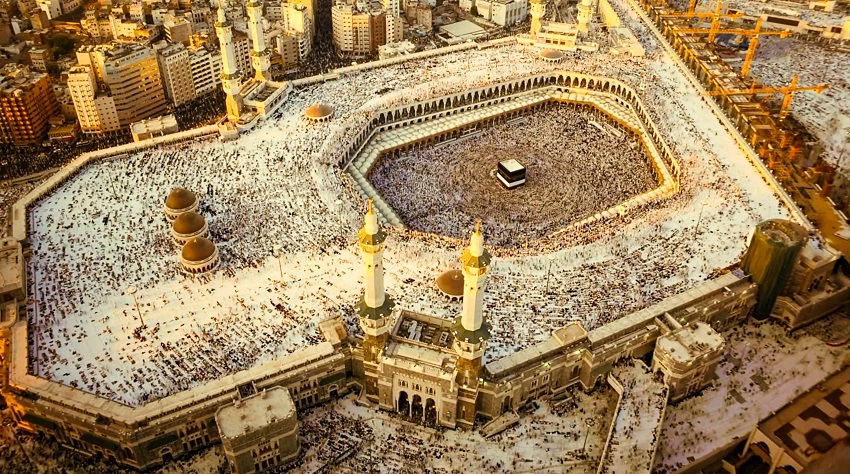The history of Umrah dates back to 629 CE when Prophet Muhammad (PBUH), along with his 2000 followers, performed Umrah for the first time. The first pilgrimage performed was a result of many struggles, negotiations, and even sacrifices by devout Muslims.
Also referred to as ‘minor pilgrimage’, Umrah is an Islamic pilgrimage to Makkah, which is the holiest city for Muslims, situated in Saudi Arabia’s Hejazi region. It is the second most religiously significant pilgrimage amongst Muslims, and can be undertaken at any time during the year, except during the days of Hajj. Listed amongst one of the most highly regarded acts of worshipping Allah, Umrah involves visiting the Kaaba and performing certain sacred rituals.
However, as per the traditional Muslim accounts, the right to carry out the Hajj and Umrah pilgrimages and access to the holy site of Makkah were not granted to Muslims. During that period, Makkah was held by Arab Pagans who worshipped idols inside it. These accounts report that all through Prophet Muhammad’s (PBUH) era, the followers of Islam wanted to gain the right to access Makkah for performing Hajj and Umrah since the former had been prescribed by the Quran. Let’s delve a bit deeper into the history of this Islamic pilgrimage, and the sacrifices and struggles it entailed.
The Religious History of Umrah
The history of Umrah dates back to 622 CE, when the Muslims of Makkah, led by Prophet Muhammad (PBUH), migrated towards Madinah to avoid persecution at the hands of non-believers, Arab Pagans, and the city authorities. On 24th September 622 CE, Prophet Muhammad completed his Hegira (the journey from Makkah to Madinah), which marks the beginning of the Year 1 in the Islamic calendar. However, performing Umrah and seeing their homeland again remained the utmost desire of the Muslims.
In 628 CE, the tensions between Pagans who occupied Makkah and the Muslims who wanted to carry out pilgrimages spiked. Prophet Muhammad (PBUH), along with his 1400 followers, approached Makkah inspired by a dream where he was undertaking the rituals of Umrah. When the inhabitants of Makkah heard about the huge number of Muslims approaching Makkah, they were concerned that the Muslims intended to attack Makkah and those who dwelled there.
Prophet Muhammad sent an emissary to the people of Makkah on reaching the outskirts of Makkah to address their concerns and explain that he only intended to perform Umrah and leave peacefully. However, they were stopped at Hudaybiyyah where Qurayshites refused them entry and were asked to come the following year for performing Umrah.
Once Prophet Muhammad refused to enter Makkah by force out of respect to the holy Kaaba, diplomatic negotiations took place. These negotiations resulted in the Treaty of Hudaybiyyah that stipulated a 10-year period, during which there would be no hostilities and the Muslims would be granted access to the holy site of the Kaaba for three days per year. So, Prophet Muhammad (PBUH) and his followers had to return home without performing Umrah.
The First Pilgrimage of Umrah
The next year, that is in 629 CE, Prophet Muhammad and his 2000 followers performed the first pilgrimage of Umrah while complying with the terms of the Hudaybiyyah treaty. The first Umrah lasted for three days. However, the peace treaty dissolved within two years when Prophet Muhammad (PBUH) and his followers were attacked by allies of the Makkans, resulting in the deaths of some Muslims. As the purpose of the treaty was to prevent bloodshed, Muhammad denounced the treaty after the killings.
By that time, Muslims had grown into a formidable force. In 630 CE, Prophet Muhammad ordered and led the conquest of Makkah. He took an army of over 10000 Muslims towards Makkah and the leaders of the Makkah inhabitants surrendered. After the transfer of power, Muhammad forgave the people of Makkah who had persecuted and fought against the early Muslims. This victory is referred to as “Succession of Makkah”.
The Importance Of Performing Umrah
The fact that the history of Umrah is laden with a lot of religious struggles and battles indicates that Umrah has always been a pilgrimage of prime importance. It is a direct Sunnah of Prophet Muhammad (PBUH) and is often referred to as a spiritual “quick-fix” for those who cannot perform the Hajj pilgrimage for any reason.
Umrah offers the best way for Muslims to pray for all their needs, seek forgiveness for their sins and refresh their faith. It is believed that performing Umrah cleanses all sins and purifies the mind, body and spirit. While performing Umrah, pilgrims get the opportunity to be the guest in the house of Allah. Many pilgrims share that they feel calm and relaxed while they are on the religious journey and can sense the blessings of Allah showered upon them. Umrah is equivalent to performing jihad and rewards of performing Umrah during Ramadan equals that of Hajj. As Prophet Muhammad has made people aware of the benefits of performing Umrah, it further strengthens the faith of an individual in the almighty Allah. Pilgrims also get expiation from their sins and are saved from hellfire for their wrong deeds.
While the benefits are many, performing Umrah in itself is a divine experience. Millions of pilgrim head towards the holy city of Makkah in order to the complete this religious journey and minor pilgrimage in Islam. The month of Ramadan sees a significant surge in the number of pilgrims due to the holiness of the month and the journey.
Prophet Muhammad was a messenger between Allah and believers. He devoted his life to showing believers the best ways of making prayers directly to Allah. He considered Umrah as one of the most effective ways of worship. Also, according to the history of Umrah, Prophet Muhammad (PBUH) performed Umrah four times during his lifetime. Umrah is believed to be a special form of worship for coming into direct contact with Allah and seeking favours. Just like fasting in Ramadan can bring devout Muslims closer to God, performing Umrah can help believers make prayers directly to Allah.
Religious History of Umrah FAQs
What is the purpose of Umrah?
Umrah holds immense religious significance amongst Muslims worldwide. It provides Muslims with a way for praying for all their needs, refreshing their faith and seeking forgiveness for all their sins.
When was the first Umrah performed?
Prophet Muhammad (PBUH), along with his 2000 followers, performed the first Umrah in 629 CE.
What are the pillars of Umrah?
Ihram, Tawaaf and Saee are the pillars of Umrah.
How many times did the Prophet perform Umrah?
Prophet Muhammad (PBUH) perform Umrah four times during his lifetime.
What are the benefits of Umrah?
It is believed that performing Umrah cleanses all sins and purifies one’s mind, body and spirit. Performing Umrah allows pilgrims to come into direct contact with Allah.
Are the benefits of Umrah equivalent to Hajj?
The benefits of performing Umrah only equals that of Hajj during the time of Ramadan. Else, it is a minor pilgrimage.
What is the location for performing Umrah?
Umrah is performed in Masjid Al Haram located in the city of Makkah.








